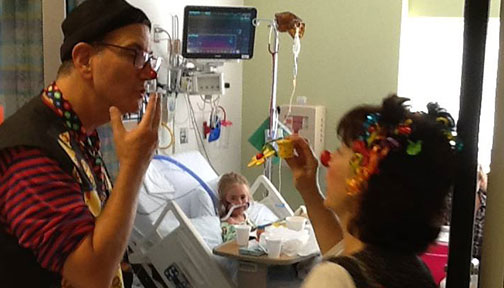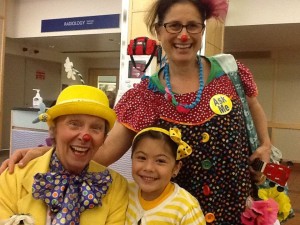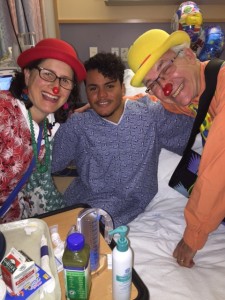 “Clowning at the bedside of a sick child is a gift to the child and his or her family. First and foremost, it allows the child to choose whether they would like this type of “therapy” – this is not a common scenario for hospitalized children, as they do not generally get to choose much of anything. Next, the clown further empowers the child by making him or her the center of attention and by following the child’s lead; again, that is an uncommon circumstance in the life of a sick child. But ultimately, the great power of clowning is to transport the child or parent to a different place for a brief period of time – a place where illness is not the focus, but where the child herself, the true essence of the child, is the focus. This type of clowning has an effect that is a potent and decidedly non-medical combination of escape and empowerment. At the end of the encounter, the child and family are a bit stronger and more resilient than before the clown entered their hospital life. That is the power of clowning.
“Clowning at the bedside of a sick child is a gift to the child and his or her family. First and foremost, it allows the child to choose whether they would like this type of “therapy” – this is not a common scenario for hospitalized children, as they do not generally get to choose much of anything. Next, the clown further empowers the child by making him or her the center of attention and by following the child’s lead; again, that is an uncommon circumstance in the life of a sick child. But ultimately, the great power of clowning is to transport the child or parent to a different place for a brief period of time – a place where illness is not the focus, but where the child herself, the true essence of the child, is the focus. This type of clowning has an effect that is a potent and decidedly non-medical combination of escape and empowerment. At the end of the encounter, the child and family are a bit stronger and more resilient than before the clown entered their hospital life. That is the power of clowning.
From the point of view of a physician caring for these patients, we view the hospital clown as a consultant member of the health care team. Just as we turn to a gastroenterologist to perform an endoscopy, we ask the clown to use his or her talent and training to transform the patient’s world for a brief moment. While many physicians are convinced of the power of the hospital clown by having seen clowns in action, others can depend upon objective data in the published medical literature.”
– Dr. Michael Agus, Medical Director
The power of “clowning around”
Medical clowns can reduce anxiety and length of hospital stay for children and medical research has found humor can have a positive effect on patients. READ MORE
Laughing Through This Pain: Medical Clowning During Examination of Sexually Abused Children: An Innovative Approach
This study examined the role of medical clowns during medical examinations of children who were sexually abused. READ MORE
Medical Clowns Facilitate Nitrous Oxide Sedation during Intra-Articular Corticosteroid Injection for Juvenile Idiopathic Arthritis
A common procedure in juvenile idiopathic arthritis, is usually associated with anxiety and pain. Following the introduction of medical clowns in our hospital, we added them as an integral part of the team performing IACI. READ MORE
 Clowning as a supportive measure in paediatrics – a survey of clowns, parents and nursing staff
Clowning as a supportive measure in paediatrics – a survey of clowns, parents and nursing staff
Hospital clowns, also known as clown doctors, can help paediatric patients with the stress of a hospitalization and to circumvent the accompanying feelings of fear, helplessness and sadness, thus supporting the healing process. READ MORE
Therapeutic clowning in paediatric practice
Clowns help children to adapt to their hospital surroundings and can distract from, and demystify, painful or frightening procedures through ‘doses of fun’ to complement traditional clinical interventions. READ MORE
Effect of a clown’s presence at botulinum toxin injections in children: a randomized, prospective study
In a pediatric ward, botulinum toxin injection is a painful procedure and a stressful experience for the child. We undertook a study of the effect of the presence of a hospital clown on children treated with botulinum toxin in an outpatient setting. READ MORE
 Medical Clowning: Even Adults Deserve a Dream
Medical Clowning: Even Adults Deserve a Dream
The article examines the significance of the integration of medical clowns as an intervention strategy with adult outpatients suffering from chronic illnesses. The dominant theme involves the definition of the clown’s role and includes perspectives on his integration into the hospital’s multidisciplinary medical staff and his impact on the staff and on patients and their families. READ MORE
Clowning Within Drama Therapy Group Sessions: A Case Study of a Unique Recovery Journey in a Psychiatric Hospital
This qualitative research delineates the recovery journey of four persons with severe mental illness that experiment, from within, with the healing potential of creating, playing and acting a clown character in a context of ten drama therapy group sessions. READ MORE
Infinite Possibility: Clowning With Elderly People
Medical research supports our human instinct that people who smile and laugh are happy, whereas those who are inexpressive are usually not happy. Research shows that humor stimulus results in mirth, which elicits a primarily emotional response with psychological effects, and laughter, which elicits a physical response with physiological effects. READ MORE
Effects of a humor-centered activity on disruptive behavior in patients in a general hospital psychiatric ward
The aim of this study is to investigate the effects of a humor-based activity on disruptive behaviors in patients hospitalized in a psychiatric ward. READ MORE
Still the Best Medicine, Even in a War Zone, My Work As a Medical Clown
Medical clowning has developed increasing prominence over the past two decades and, over the past 10 years, has been especially used in treating people suffering from post-traumatic stress disorder (PTSD) in war zones and in the wake of natural disasters. READ MORE
The effect of medical clowning on pregnancy rates after in vitro fertilization and embryo transfer
Medical clowning as an adjunct to IVF-ET may have a beneficial effect on pregnancy rates and deserves further investigation. READ MORE
Tackling Indifference—Clowning, Dementia, and the Articulation of a Sensitive Body
Focus on a special form of clowning for people at an advanced stage of dementia. The clown is presented as a specialist in contact with people with whom communication is no longer possible by the usual (linguistic, cognitive) means. READ MORE
Humor in the “Twilight Zone”: My Work as a Medical Clown With Patients With Dementia
Medical clowning has been primarily identified with working with children in pediatrics wards in hospitals. Over the past decade, more and more medical clowns have been working with adults and with patients with dementia as part of holistic care. Along with traditional medical care by hospital staff, the medical clown treats the patient’s emotional side. READ MORE
Stand up for dementia: Performance, improvisation and standup comedy as therapy for people with dementia; a qualitative study
The aim of this qualitative study was to describe and investigate the effects of a program of stand-up comedy and improvisation workshops on people with early stage dementia. The data suggest that the program may have therapeutic benefits as improvements in memory, learning, sociability, communication and self-esteem were demonstrated. READ MORE



